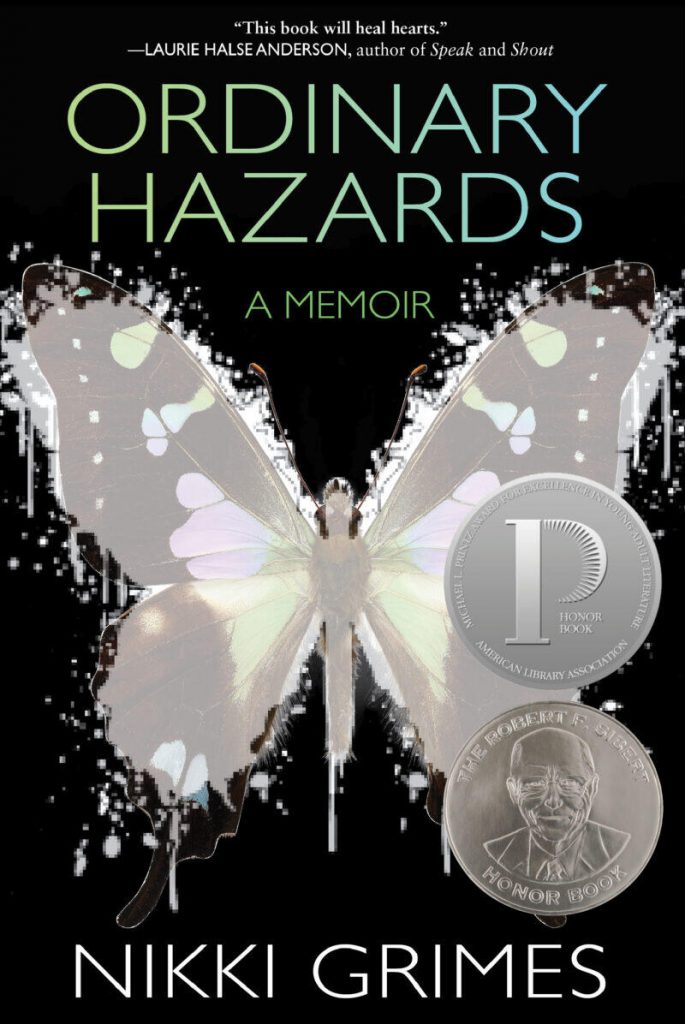
1. Bibliography
Grimes, Nikki. 2019. Ordinary Hazards: A Memoir. Honesdale, PA: WordSong. ISBN 978-1-62979-881-3
2. Plot Summary
In Ordinary Hazards: A Memoir told in verse, Nikki Grimes recounts her own personal history from her birth in 1950 until her mid-teenagerhood in 1966. Grimes’s story is one of great trauma. As the second child of a marriage doomed to fail, Nikki remembers lots of yelling. When her father moves out, Nikki’s alcoholic, schizophrenic mother goes to find a job, leaving Nikki and her older sister, Carol, in the hands of an abusive “babysitter” who locks the girls in the closet until just before their mother gets home in the evening. A little later, when their mom can’t seem to make ends meet, Nikki and Carol move in with cousins who “shoot up” regularly. Foster care, splitting Nikki and Carol apart, comes quickly thereafter. It is while staying with her foster family that Nikki learns the power of the pen to calm her fears and manage her burdens. When Nikki returns to her mother, she is beset by gang violence, sexual abuse, racism, and the death of a loved one. Yet, while her childhood is traumatic, Nikki finds her footing with her writing, her religious convictions, and the support of her sister, her writing teacher, and her best friend Debra. The end of Grimes’s memoir includes personal photographs from various periods of her childhood and young adulthood.
3. Critical Analysis
There’s no doubt about it: Nikki Grimes has the gift of language. From page one, readers will want to invest in the story of the woman whose name is a lie, her first “invention” to protect herself from the real name that “wasn’t worth a lot.” Nikki quickly reveals the book’s title in an early poem, “On Our Own,” writing that she was never warned that “the world was full of / ordinary hazards / like closets with locks and keys.” For Nikki, a key becomes an “ordinary hazard” that locks her in a closet for hours on end while to an outside observer, a key appears to be an object of security just like mothers and grandmothers are supposed to be people of security (although for Nikki, they’re not) and bedrooms are supposed to be places of security (although for Nikki, it’s not).
Yet, while Nikki’s “ordinary hazards” provoke readers to horror, her adolescent life—though exceedingly difficult—is punctuated by what Nikki sees as God’s grace. For her, “hard evidence appears / round every corner.” It’s in the Christian church that Nikki is drawn to that leads her to her best friend, Debra. It’s in her reacquaintance with her father who becomes Nikki’s ally and confidante. It’s in her metamorphosis, as the slip cover shows, of a pitiful black moth—blurry on the edges—into a striking butterfly of neon light revealed underneath. Readers will come away from Nikki’s trauma-filled story full of that same hope she feels as an aspiring poet when the famous writer James Baldwin reads her writing, looks her in the eye, and asks her to give him a call.
African American culture plays a part in Nikki’s formation. Through it, she experiences deep trauma: For example, in June 1964, she mourns the “white-hooded devils” who killed black men like Chaney, Goodman, and Schwerner, and she’s physically scarred when she refuses to join a neighborhood gang. But through her culture, she also experiences deep peace: attending the Convent Avenue Baptist Church, dubbed a “Black church” by Nikki, brings her the family she’d never had and gives her the strength to “brave the darkness at home, once again.” Her father teaches Nikki about Black history, Black painters, Black musicians, and Black writers, allowing Nikki to see “Black so beautiful,” and to dream of herself as a singer, a dancer, and a writer. Never before have I read a book so unapologetically candid about both the negative and the positive aspects of a culture.
Nikki Grimes’s book invites readers of all backgrounds to rise above their difficulties and cultivate their talents. Raw, gripping, and packing a powerful poetic punch, Ordinary Hazards deserves a place on every young adult shelf. Highly recommended.
4. Rewards and Review Excerpts
Cybils Awards, 2019, Finalist, Poetry
Michael L. Printz Award, 2020, Honor
Robert F. Sibert Informational Book Medal, 2020, Honor
Horn Book Fanfare Title, 2020, Nonfiction
From Kirkus: “Grimes recounts her story as a memoir in verse, writing with a poet’s lyricism through the lens of memory fractured by trauma. Fans of her poetry and prose will appreciate this intimate look at the forces that shaped her as an artist and as a person determined to find the light in the darkest of circumstances. A raw, heartbreaking, and ultimately uplifting story of trauma, loss, and the healing power of words.”
From Booklist: “The memoir has heartbreaking moment—seven soul-crushing ones—that will make readers ache for young Grimes and teens grappling with similar circumstances. But inspiring moments bolster her raw, resonant story, showing that there is always light at the end of the darkest of tunnels.”
5. Connections
Ordinary Hazards is a memoir told in verse. Invite teens to write a few memoir poems of their own. Then invite them to share their poems in an online library showcase if comfortable.
Create a display of Ordinary Hazards and other children/YA books written by Nikki Grimes, such as the following selections:
- One Last Word. ISBN 9781619635548
- Garvey’s Choice. ISBN 9781501964695
- Bronx Masquerade. ISBN 9780803725690
- Words With Wings. ISBN 9781590789858
- Off to See the Sea. ISBN 9781492638292
- Legacy: Women’s Poets of the Harlem Renaissance. ISBN 9781681199450
*Note—This book review was created as an assignment for a course at Texas Woman’s University.
